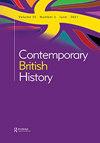避免(不必要的)离境:冷战期间英国外交和苏联集团异见人士
IF 0.5
2区 历史学
Q1 HISTORY
引用次数: 0
摘要
在20世纪70年代中期,没有一位西方领导人在对苏联集团国家进行正式访问时,会浪费时间考虑是否会见异见人士,即使是在异见人士确实存在的国家。到20世纪80年代末,这样的会面几乎成了一种强制性的仪式。在这一迅速而戏剧性的转变发生之前,外交官和持不同政见者之间的关系也发生了类似的变化。尽管东道国政权有相当大的阻力,这些政权有时采取包括驱逐在内的报复措施,但所有这一切还是发生了。本文考察了英国在这一规范和实践变革中所扮演的角色。它确定了英国政府和苏联集团持不同政见者之间的不同层次的关系,区分了“准接触”、政治接触和外交接触。它展示了20世纪80年代与持不同政见者面对面的政治和外交接触是如何在频率和范围上增加的,以及部长和外交官的接触是如何相互促进的。最后,讨论了这种变化的可能解释。本文章由计算机程序翻译,如有差异,请以英文原文为准。
Avoiding (unwanted) departures: British diplomacy and Soviet Bloc dissidents during the Cold War
ABSTRACT In the mid-1970s, no Western leader on an official visit to a Soviet Bloc country wasted any thoughts on whether or not to meet a dissident, even in countries where dissidents actually existed. By the late 1980s, such encounters had become part of an almost obligatory ritual. This remarkably swift and dramatic transformation was both preceded and accompanied by a similar change in the relationship between diplomats and dissidents. All of this happened despite considerable resistance on the part of the regimes in the host countries, which sometimes resorted to retaliatory measures, including expulsions. This article examines the role played by the United Kingdom in this normative and practical change. It identifies the different layers of relationships between the British government and Soviet Bloc dissidents, distinguishing between ‘para-contacts’, political contacts, and diplomatic contacts. It shows how political and diplomatic face-to-face contacts with the dissidents increased in frequency and scope during the 1980s, and how ministers’ and diplomats’ contacts furthered each other. Finally, it discusses possible explanations for this change.
求助全文
通过发布文献求助,成功后即可免费获取论文全文。
去求助
来源期刊

Contemporary British History
HISTORY-
CiteScore
1.40
自引率
14.30%
发文量
34
期刊介绍:
Contemporary British History offers innovative new research on any aspect of British history - foreign, Commonwealth, political, social, cultural or economic - dealing with the period since the First World War. The editors welcome work which involves cross-disciplinary insights, as the journal seeks to reflect the work of all those interested in the recent past in Britain, whatever their subject specialism. Work which places contemporary Britain within a comparative (whether historical or international) context is also encouraged. In addition to articles, the journal regularly features interviews and profiles, archive reports, and a substantial review section.
 求助内容:
求助内容: 应助结果提醒方式:
应助结果提醒方式:


